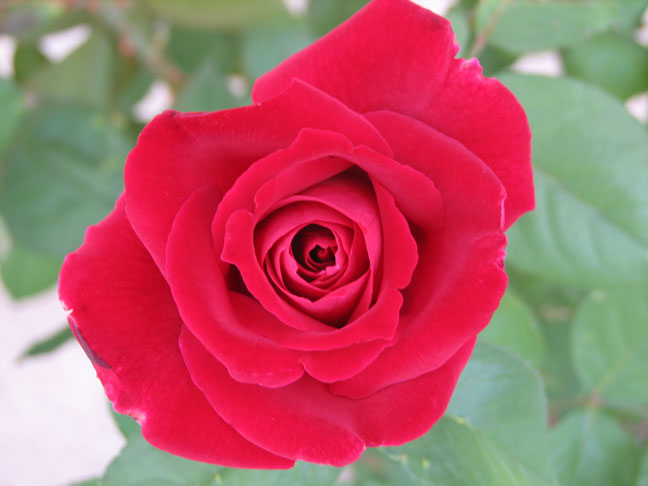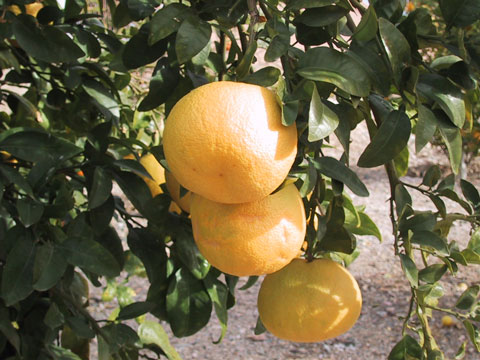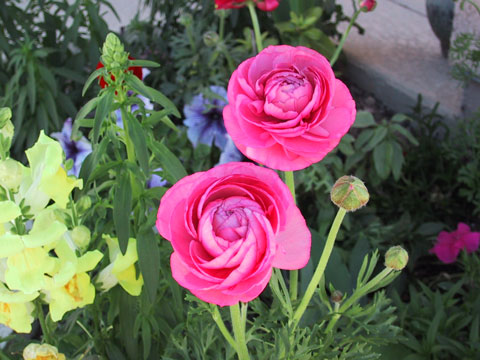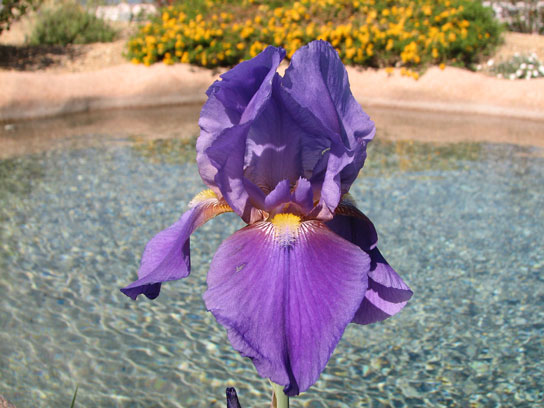Article & Photos Courtesy of Dottie Holman of LHC Master Gardeners
With the fall season upon us, it is time to think “gardening” again and what needs to be done. We should be showing cooler nights, maybe some more rain or windstorms. Since this will be the beginning of the planting season, there are several things that need to be done.
Be sure that any newly planted trees are staked properly so as not to be damaged by a windstorm. Also, if we have a heavy rainfall, check to see if any of that rain made it into the soil. A good steady rain will soak into the ground where a downpour usually winds up in the washes.
 Roses are really showing heat stroke now. When the temperatures cool, new shoots will start coming out. Now is the time to prepare your roses for their winter bloom. Remove all debris from around the bushes and trim dead leaves and branches from the bushes. Now I used the word “trim,” not “prune.” This is not the time to prune back your roses. January is when roses receive their yearly pruning.
Roses are really showing heat stroke now. When the temperatures cool, new shoots will start coming out. Now is the time to prepare your roses for their winter bloom. Remove all debris from around the bushes and trim dead leaves and branches from the bushes. Now I used the word “trim,” not “prune.” This is not the time to prune back your roses. January is when roses receive their yearly pruning.
But, if pruning is your thing, you can do early pruning on oleanders, privets, Texas Rangers and Arizona rosewood. The Mexican Bird of Paradise will bloom strongly with a trimming of the brown seedpods that are appearing on them now.
This is the time to start preparing your vegetable and flower beds for fall planting with compostand amendments (not manure which will just add additional salt to the soil). This is mandatory since the hot summer heat literally bakes the nitrogen out of the soil, not to mention what our alkaline water does to it. Prepare a good base of at least four to six inches and work it in as deep as you can go. This is important since bedding plant roots can grow as deep as one foot, vegetables even deeper. Water the amendments in well and it is best to let soil sit prior to planting so that all the organic matters can “settle in.”
 Fertilizing can be done once we cool down a bit more. You want cooler evenings and day temperatures to be in the low 100’s to high 90’s. What you don’t want to do is to fertilize and burn any new growth that will come out due to fertilizing. This will only stress your plants. When fertilizing, be sure to read the label and follow the directions carefully. All plants can be fertilized including citrus. When fertilizing your citrus, be sure that the ground is wet prior to fertilizing and add additional water after applying the fertilizer. The fruit that is on your citrus has survived our summer heat and the skin is hard, so be careful not to over water your citrus. In doing so, you could cause the fruit to swell and then the skin can split.
Fertilizing can be done once we cool down a bit more. You want cooler evenings and day temperatures to be in the low 100’s to high 90’s. What you don’t want to do is to fertilize and burn any new growth that will come out due to fertilizing. This will only stress your plants. When fertilizing, be sure to read the label and follow the directions carefully. All plants can be fertilized including citrus. When fertilizing your citrus, be sure that the ground is wet prior to fertilizing and add additional water after applying the fertilizer. The fruit that is on your citrus has survived our summer heat and the skin is hard, so be careful not to over water your citrus. In doing so, you could cause the fruit to swell and then the skin can split.
 Fall season provides excellent planting months. Our soil is still warm and will giveshrubs, vines, palms, trees, agaves and cactitime to set root before our temperaturescool down. Vegetable planting can startonce temperatures drop below 100 degrees.We start vegetables early here sothat they can become established prior toJanuary and be enjoyed before April whenour heat can arrive. Sow beets, cabbage,carrots, celery, chard, green onions, kale,kohlrabi, leeks, lettuce, parsley, peas, potatoes,spinach, radishes and turnips. Strawberriesand tomatoes can beplanted now also. If we geta cold spell (below 40 degrees)in December/Januaryyou will need to cover themwith sheets to protect themfrom possible frost.
Fall season provides excellent planting months. Our soil is still warm and will giveshrubs, vines, palms, trees, agaves and cactitime to set root before our temperaturescool down. Vegetable planting can startonce temperatures drop below 100 degrees.We start vegetables early here sothat they can become established prior toJanuary and be enjoyed before April whenour heat can arrive. Sow beets, cabbage,carrots, celery, chard, green onions, kale,kohlrabi, leeks, lettuce, parsley, peas, potatoes,spinach, radishes and turnips. Strawberriesand tomatoes can beplanted now also. If we geta cold spell (below 40 degrees)in December/Januaryyou will need to cover themwith sheets to protect themfrom possible frost.
 Flowers to plant are calendula, larkspur, lobelia, pansies, snapdragons, stock, sweet alyssum and violas along with daffodils, Dutch irises, narcissus and ranunculus. If you like crocus, grape hyacinth, and tulips, you will need to pre-chill them in your refrigerator in paper bags for about six to eight weeks. Plant them around Thanksgiving for spring bloom. If needed, bearded irises can be divided now.
Flowers to plant are calendula, larkspur, lobelia, pansies, snapdragons, stock, sweet alyssum and violas along with daffodils, Dutch irises, narcissus and ranunculus. If you like crocus, grape hyacinth, and tulips, you will need to pre-chill them in your refrigerator in paper bags for about six to eight weeks. Plant them around Thanksgiving for spring bloom. If needed, bearded irises can be divided now.
Mark your calendar and circle November 3rd for the annual Meet the Master Gardeners Day at the Library from 9:00 am to 1:30 pm. We will be there with workshops, demonstrations and information booths.
So start making your list and check it twice, the fall weather is going to be twice as nice.
For details, call the Lake Havasu Master Gardeners hotline at 928-753-3788 or email Mohavece@cals.arizona.edu or see them the first Tuesday of the month, 11 am – 1 pm at the Mohave County Library.

